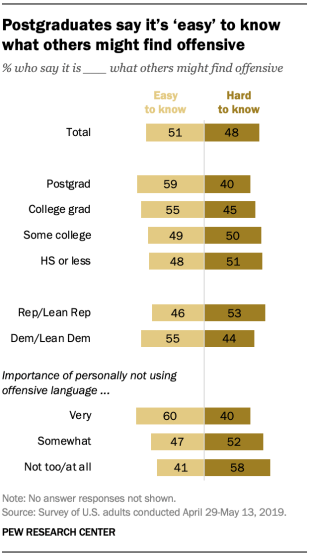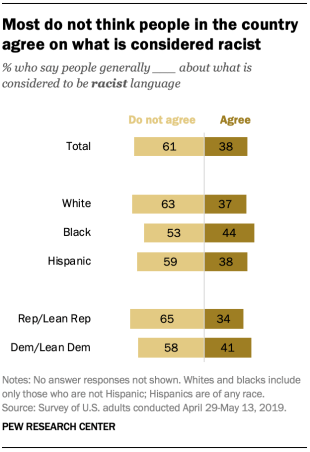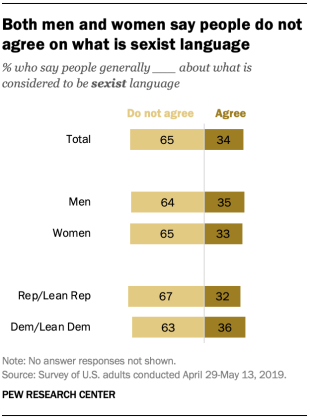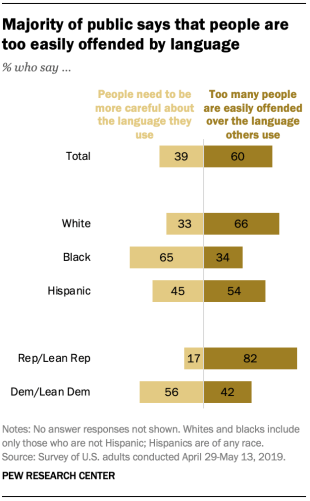Majorities of the public say there is not agreement in the country over what is considered sexist (65%) or racist (61%) language; and about half (48%) say it is hard to know what other people might find offensive.
There’s a modest partisan divide over whether it’s easy or hard to know what others might find offensive. Republicans and Republican-leaning independents are somewhat more likely to say it’s hard (53%) than easy (46%) to know what other people might find offensive. By contrast, a narrow majority of Democrats and Democratic leaners (55%) say it’s easy to know what others might find offensive; 44% say it’s hard to know.

Postgraduates (59% to 40%) and college graduates (55% to 45%) are more likely to say it’s easy than hard to know what other people would find offensive. Those with some college experience or no more than a high school diploma are about evenly divided over how easy it is to know what others find offensive. Democrats with higher levels of education are more likely than less-educated Democrats to say it’s easy to know what others might find offensive. Among Republicans, there are no significant differences in views by level of education.
Six-in-ten of those who say it’s very important to them personally to use language that other people do not find offensive say it’s easy to know what people would be offended by. Smaller shares of those who say it’s somewhat (47%) or not too or not at all important (41%) to them personally to use inoffensive language say it’s easy to know what others find offensive.

By 61% to 38%, more Americans say people generally do not agree over what is considered racist language.
Black people are somewhat more likely than whites and Hispanics to say people agree about what is considered racist language. Still, just 44% of blacks say that people generally agree on what is considered to be racist language, while 53% say people do not agree on this. Majorities of whites (63%) and Hispanics (59%) say people do not agree on this.
Among Republicans and Republican leaners, 65% say people generally do not agree over the definition of racist language; 58% of Democrats and Democratic leaners say the same

Similar to views on what constitutes racist language, just 34% say people agree on what is considered to be sexist language; a far larger share (65%) says people do not agree about this.
There is no gender gap in views on this question: 65% of women and 64% of men say people generally do not agree over what sexist language is.
Among partisan groups, 67% of Republicans and Republican leaners and 63% of Democrats and Democratic leaners say people do not generally agree over what constitutes sexist language.
There are large partisan and racial differences when it comes to views on the care people should take with language and how quick people are to take offense.

When asked to choose which statement better describes their views, 60% say that too many people are easily offended these days over the language that others use; a smaller share (39%) says people need to be more careful about the language they use to avoid offending people with different backgrounds.
Views among whites and blacks are nearly the opposite of each other. About two-thirds of blacks (65%) say that people need to be more careful about the language they use to avoid offending others; 34% say that too many people are easily offended over language these days. Among whites, views are the reverse: 66% say that too many people are easily offended over the language others use, compared with 33% who say people should be more careful with their language. Among Hispanics, 54% say people are too easily offended, while 45% say people should be more careful with their language.
There is a wide partisan gap on this question. A large majority of Republicans and Republican leaners (82%) say people are too easily offended. By contrast, Democrats and Democratic leaners are more likely to say that people should be more careful with their language to avoid causing offense (56%) than to say that people are too easily offended over the language others use (42%).
Among Democrats, blacks are substantially more likely than whites to say that people need to be more careful with their language. About two-thirds (67%) of black Democrats say this, compared with 55% of white Democrats.




